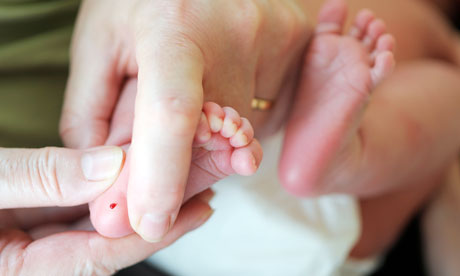Save newborn blood samples, say bioethicists
Blood samples left over from newborn screening tests are a genetic treasure trove which should be available to researchers.
 Blood samples left over from newborn screening tests are a genetic treasure trove which should be available to researchers, argue bioethicists in the journal Science Translational Medicine.
Blood samples left over from newborn screening tests are a genetic treasure trove which should be available to researchers, argue bioethicists in the journal Science Translational Medicine.
Nearly 4 million American newborns undergo mandatory screening every year, and privacy-related and ethical concerns about what happens to the remaining blood spots could hamper research. .
The use of these residual dried blood samples (DBS) has been controversial, as parents in Minnesota and Texas have sued their states for retaining them without parental permission.
The settlement in the Texas suit resulted in the destruction of 5.3 million archived blood samples. The Minnesota Supreme Court ruled that informed consent will be required for the blood samples to be retained for research. Minnesota now plans to start destroying leftover samples when newborn screening is completed.
This narrow view of privacy is hampering research, the bioethicists complain. “The potential value to biomedical research for improving both public health and individual health must be part of the public discussion about what should happen to residual dried blood samples from newborn screening,” says Michelle Huckaby Lewis, of the Johns Hopkins Berman Institute of Bioethics.
“The research community must advocate for policies that support the retention of these samples and their use in biomedical research,” Lewis said. “We should be the generation that recognizes the potential value of these samples and commits to developing them as a resource to promote public and individual health. The scientific community has a responsibility to the nation and its citizens to use these resources ethically, but also to the fullest extent possible to improve the health of our citizenry.” ~ GenomeWeb Daily News, Nov 8
Michael Cook

A court in Bahrain has sentenced 23 medical professionals to 3 months in prison each or payment of a fine for involvement in last year’s pro-democracy protests, according to the BBC. Prosecutor Abdulrahman al-Sayyed said 5 other medics have been exonerated. The sentences follow the publication of an Amnesty International report which criticized the kingdom for its “spiralling” repression. At least 95 health workers were arrested between February and March 2011, drawing widespread international opposition. According to Mr al-Sayyed, the 23 defendants “committed crimes and violations, breaching the law and [medical] norms”. He also said the medics could choose to pay a fine of 200 dinars (US$530) to have their sentences suspended, and that they had the right to appeal.
The case dates back to February and March 2011, when the medics worked at the Salmaniya Medical Centre in Manama. The hospital treated many who were injured when security forces suppressed pro-democratic protests. Doctors at Salmaniya Medical Centre voiced opposition to the crackdown in interviews with foreign press after treating the injured, or engaged in the protests after shots were fired at ambulances. Physicians for Human Rights claims that at least 95 health workers were arrested after King Hamad declared a state of emergency and brought in military forces from neighbouring Gulf states. The medics and human rights groups say the convictions were politically motivated, and aimed at quashing dissent. ~ BBC News, Nov 21; BMJ, Nov 23
Creative commons
genetics
privacy
